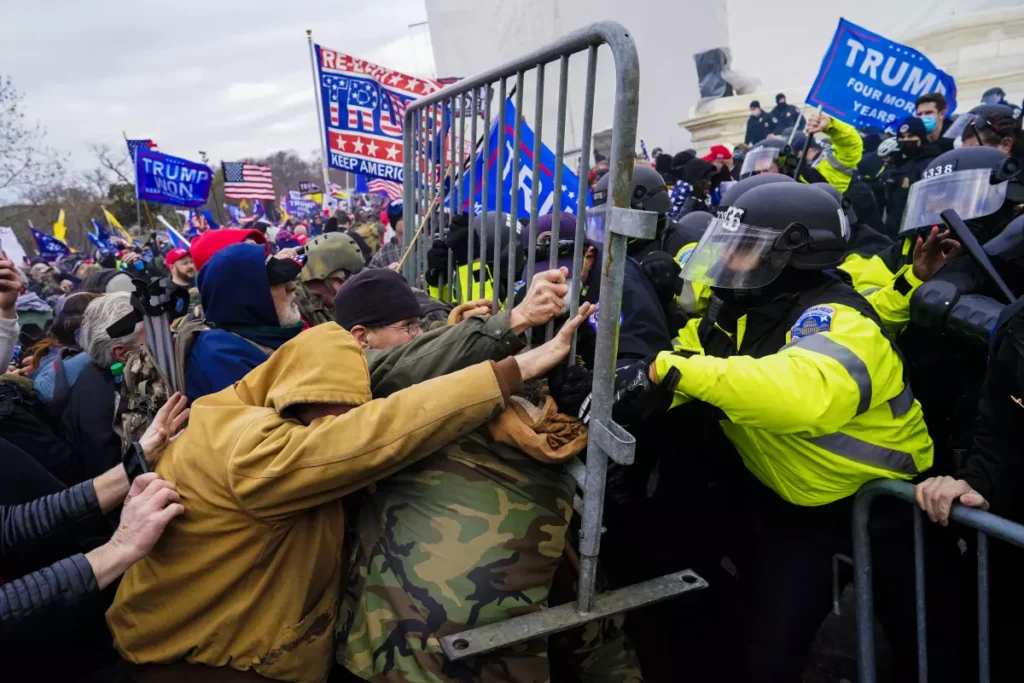
President-elect Donald Trump faces expectations from Jan. 6 Capitol riot defendants, who hope he’ll fulfill his campaign promises to pardon them upon taking office in January.
Some defendants have indicated in court that they expect to be pardoned, while others have expressed their anticipation to their lawyers. However, it remains unlikely that Trump’s clemency will extend to every individual involved.
On the campaign trail, Trump often vowed to pardon these defendants but tempered his remarks, noting that some had committed violent acts. “I can’t say for every single one because a couple of them, probably they got out of control,” Trump commented at a town hall last year, pledging to pardon “a large portion of them.”
At a rally in Wisconsin this past September, Trump committed to acting quickly on the pardons. “The moment we win, we will rapidly review the cases of every political prisoner unjustly victimized by the Kamala Harris regime, and I will sign their pardons on Day One,” Trump promised. “We will completely overhaul Kamala’s corrupt Department of Injustice.”
With presidential authority to grant clemency, Trump could pardon defendants, effectively erasing their charges. Alternatively, he could commute sentences for those still incarcerated, reducing or ending their jail time but leaving the charges intact. Trump could also direct the Department of Justice to end ongoing prosecutions for those not yet convicted.
Attorney William Shipley, who has represented dozens of Jan. 6 defendants, noted that a Trump pardon could even benefit those who have completed their sentences. “It’s principally restoration of your civil rights, your right to vote, your Second Amendment rights, and any other rights that you might have lost by virtue of the felony,” Shipley told media outlets.
Profiles of Riot Participants
Prosecutors report that nearly 600 defendants either assaulted police officers or obstructed law enforcement, with a third wielding deadly weapons or causing severe injuries. Incarceration sentences have ranged from a few days to several years, depending on the charges.
Some defendants merely entered restricted Capitol areas briefly and without incident, while others engaged in violent and destructive acts. One case involved a 53-year-old hairdresser who entered the Capitol hallway, stayed for 10 minutes, and later posted on social media about her pride in participating. She pled guilty to “parading, demonstrating, or picketing” and received a 14-day prison sentence.
In contrast, Scott Fairland, a gym owner, wielded a police baton, scaled scaffolding, and was seen on video urging the crowd to “disarm” police and “storm” the Capitol, shoving an officer and punching a shield. He was sentenced to 3.5 years in prison.
Some supporters of Trump associated with extremist groups, like the Proud Boys and Oath Keepers, received sentences of 10 to 20 years on rare seditious conspiracy charges.
Who is Requesting Pardons?
Reporters asked Shipley if his clients had expressed interest in pardons. “The better question would be, who haven’t I heard from?” Shipley replied, adding that he advised clients to “have a little bit of patience” as the process unfolds.
But for some defendants, patience has run thin. Brandon Heffner recently asked a judge to pause his trial, indicating he expects a pardon if convicted. Heffner, who was arrested last year and faces five nonviolent charges, allegedly wore tactical gear and blocked a Capitol door to prevent police from exiting. DOJ prosecutors opposed his motion, calling it “speculation and conjecture.”
Similarly, attorneys for Christopher Carnell requested a pause in his proceedings after his conviction on nonviolent charges. Court records indicate Carnell entered the Capitol, mingling with rioters who were rummaging through Senator Ted Cruz’s papers. His attorneys cited the potential for a pardon from the new administration, though Judge Beryl Howell quickly dismissed the request, stating that presidential pardon power “is irrelevant to the Court’s obligation to carry out the legal responsibilities of the Judicial Branch.”
Enrique Tarrio, the former Proud Boys chairman sentenced to 22 years, celebrated Trump’s victory in a statement through his attorney, expressing optimism for the future.
Next Steps Under Trump’s Administration
More than 1,500 individuals have faced federal charges for the Capitol riot over the past four years, with most pleading guilty or being convicted. Trump has repeatedly referred to the defendants as “hostages,” praised them at his rallies, and depicted them as victims of political persecution.


















